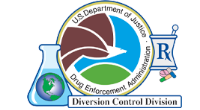Controlled Substances Export Reform Act of 2005
Reexportation of Controlled Substances to a Second Country
The Controlled Substances Export Reform Act of 2005 (CSERA) was enacted on August 2, 2005. The Act amends the Controlled Substances Import and Export Act (CSIEA) to provide authority for the Attorney General (and DEA, by delegation) to authorize the export of controlled substances in schedules I and II, and narcotic controlled substances in schedules III and IV, from the United States to another country for subsequent export from that country to a second country, if certain conditions and safeguards are satisfied.
The CSERA requires the following:
- Both the country to which the controlled substance is exported from the United States (referred to in this subsection as the 'first country') and the country to which the controlled substance is exported from the first country (referred to in this subsection as the 'second country') are parties to the Single Convention on Narcotic Drugs, 1961, and the Convention on Psychotropic Substances, 1971.
- The first country and the second country have each instituted and maintain, in conformity with such Conventions, a system of controls of imports of controlled substances which the DEA deems adequate.
- With respect to the first country, the controlled substance is consigned to a holder of such permits or licenses as may be required under the laws of such country, and a permit or license to import the controlled substance has been issued by the country.
- With respect to the second country, substantial evidence is furnished to the DEA by the person who will export the controlled substance from the United States that:
(A) The controlled substance is to be consigned to a holder of such permits or licenses as may be required under the laws of such country, and a permit or license to import the controlled substance is to be issued by the country; ands
(B) The controlled substance is to be applied exclusively to medical, scientific, or other legitimate uses within the country. - The controlled substance will not be exported from the second country.
- Within 30 days after the controlled substance is exported from the first country to the second country, the person who exported the controlled substance from the United States delivers to the DEA documentation certifying that such export from the first country has occurred.
- A permit to export the controlled substance from the United States has been issued by the DEA.
If either the first or second country refuses the shipment, the reexporter may seek authorization from the DEA to return the shipment to the United States. Shipments that have been rejected by the second country may not be returned to the first country.
Controlled substances may be exported from the United States to a “first country” for reexport to more than one “second country” (but no further export from any second country to a third country), provided the exporter notifies DEA of this intent in the application for export permit, and provided that the CSERA is fully complied with in all other respects.
An application for a permit to export controlled substances shall be made on DEA Form 161, and an application for a permit to reexport controlled substances shall be made on DEA Form 161R.

